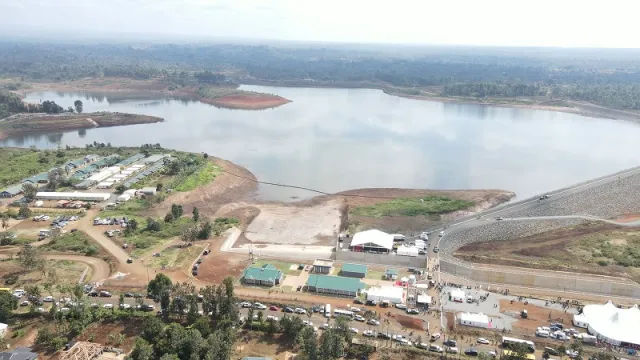President Ruto spells out Kenya’s path to food security

President Ruto spells out Kenya’s path to food security
With roughly four million Kenyans grappling with hunger and starvation, ensuring the country’s food security moving forward is among the new government’s top goals, President William Ruto noted when he commissioned Thiba dam in the expansive Mwea rice farming zone.
During the event, the president revealed that his administration is banking on stronger production to resolve the high food prices in the country by expanding irrigation and lowering the costs of key inputs such as fertilizer.
Drawing on Thiba dam’s magnified capacity which is set to expand rice acreage in Mwea by 10,000 acres and facilitate two growing seasons in a year, the president set out how his government plans to leverage the country’s untapped farmland to reduce reliance on imports that impair forex reserves.
“The country produces around 240,000 tonnes of rice and imports about 900,000 tonnes yet we have land suitable for rice cultivation. What we are doing here in Mwea will be replicated in Tiata Taveta, Kilifi, Tana River, Garissa, Kisumu, Migori, Busia, Turkana and Baringo counties because we have 200,000 acres in 10 counties on which we can farm the rice we import and lose a lot of foreign exchange,” said Dr Ruto.
Read also: Agriculture at the heart of Equity Bank’s financial model
Dr Ruto reiterated his administration’s commitment to lowering food prices in the long run by subsidizing production for ample supply, in contrast with bankrolling consumption as in the ineffective maize subsidy in the lead-up to the August 9 election.
The president announced that 1.5 million bags of fertilizer have been issued to farmers in readiness for the upcoming short rains season, with an additional seven million bags designated for the next year.
“I want to assure all Kenyans, especially farmers, that now we have a second phase laid out. As we enter the subsequent season starting January, the government has set aside 7 million bags of ferterliser in readiness for distribution to all farmers be it rice, maize, wheat, coffee, tea etc.
“We want to change Kenya so that it ceases being a begging, hunger stricken country. It is very shameful that in the 21st century, nearly 60 years after independence the country still contends with food insecurity. That’s the shame of a nation without a plan on how to grow its food,” he said.



